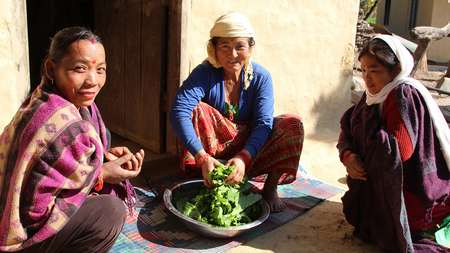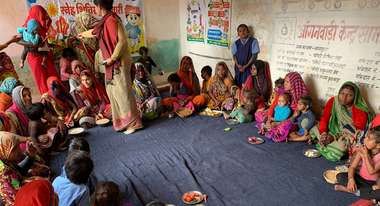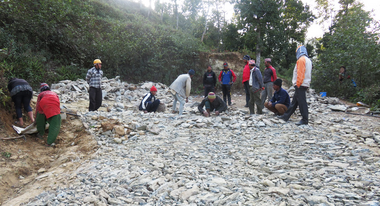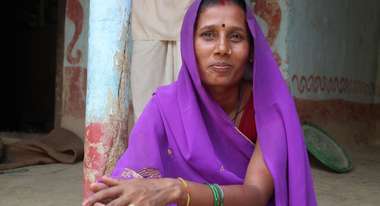
Empowerment for marginalised people
There have been clear successes in Salyan, Nepal. The number of undernourished children has fallen, harvests have increased, and family incomes have grown. But that is not all that the Welthungerhilfe project has achieved. It teaches people about their rights, particularly considering members of lower castes in the caste system of Nepal.
Good health thanks to nutrition training
Rabin Shrestha has to take off his shoes, because the mountain river in the Salyan region is flowing much more strongly than usual. The Welthungerhilfe employee and his colleague, Uma Thapa, wade through the ice-cold water. They are on their way to a remote village in the Kalimat Rampur district. Welthungerhilfe has been organising nutrition and farming training here for three years.
To activate English subtitles, click on the video and on the 'Settings' icon at the bottom right.
Marching across the fertile hills and valleys, it is hard to imagine that many people in Nepal suffer from hunger or malnutrition. “Climate change is becoming increasingly extreme”, explains Rabin. Periods of drought are followed by floods, and it is often impossible to calculate harvest time. Nepal is one of the poorest countries in the world, and incomes in rural areas here are barely enough to survive on. However much the farmers grow, there are many daily essentials that they must buy from the neighbouring town.
After an hour, Rabin and Uma reach their destination. Kalsari Sijali’s family is waiting for them. Kalsari and her husband have built their house on a small plateau, and behind it they have their own vegetable garden, cabbage fields, and terraces for growing cereals. Are there problems in this little paradise? “Oh yes, we had big problems”, says Kalsari.
This is because the crops they grew used to only last for half the year, and then it was hard to make ends meet. They had few vegetables apart from the staple food, rice. Many children, including Kalsari’s, were malnourished. These are not good conditions for a ten-year-old who has an hour’s walk down the valley to school every day.
Fine produce from the fields doubles income
Nutrition training covers the basics. How can I prepare the land so that I can harvest several times a year? How can I grow different types of vegetables to have a more varied diet and enrich my food with vitamins and nutrients? The trainers from three local Welthungerhilfe partners – Rural Reconstruction Nepal (RRN), Local Initiatives for Biodiversity, Research and Development (Li-Bird), and Aasaman Nepal – find that people are open to hearing about better nutrition. Concerned parents are very interested in their children’s health – and their own.
So now there are also tomatoes, ginger, pomegranates and citrus fruits growing in these fields. For some time now, Kalsari and her family have not just been growing to meet their own needs. Once a week they sell their produce at the local market, and they have doubled their income over recent years. They will soon add honey and the spicy local “timur” pepper to their range.
Raising awareness to fight powerlessness in the caste system
Welthungerhilfe takes a holistic approach in Nepal. In addition to nutrition, the organisation also focuses on education, health, and raising awareness of their rights among marginalised groups. The traditional caste system excludes a lot of people from improvements in society and denies them their rights. Welthungerhilfe and its local partners want to change that.
A few valleys and a lot of mountains away, Parbati Bishwakarma has a visitor. Once a week, an advisor from the local partner organisation makes the long journey to remote villages. Parbati’s family belongs to the dalit caste, the lowest group in the Nepalese caste system. Her son is looking for a job in India, and she works with her husband to help her four other children get by.
We have to know our rights and demand them. Then we ourselves can ensure that our life improves.
Parbati Bishwakarma belongs to the dalit caste, the lowest group in the Nepalese caste systemThe land is fertile but hilly. No rainwater remains on the fields – it all washes down into the valley. For many years there was no money for a water channel. Welthungerhilfe’s awareness-raising work showed the inhabitants that they had many more rights than they actually thought, and that the regional government had to spend 15 percent of its annual budget on agriculture, including in Parbati’s region.
After months of requests, the government was actually prepared to invest the money. There is now an irrigation channel, which ensures that food can be grown for more months of the year. Parbati Bishwakarma is beaming: “We have to know our rights and demand them. Then we ourselves can ensure that our life improves.”
In the early evening it is time to return to Kalimat Rampur, where Kalsari is starting to produce biological pesticides. Cow’s urine mixed with different plants creates a pesticide that is just as effective as chemical pesticides. However, it is a lot cheaper and healthier in nutrition terms. This is something else that Kalsari has learnt in nutrition training, and since then child malnutrition has become a thing of the past for her.
“I used to think that when my children had grown up, I should send them to the town to look for work,” said Kalsari. “But now I think that maybe they should stay here and live a healthy life in the countryside.”
Ralph Weihermann is a filmmaker based in Cologne who visited the project in February 2018.






